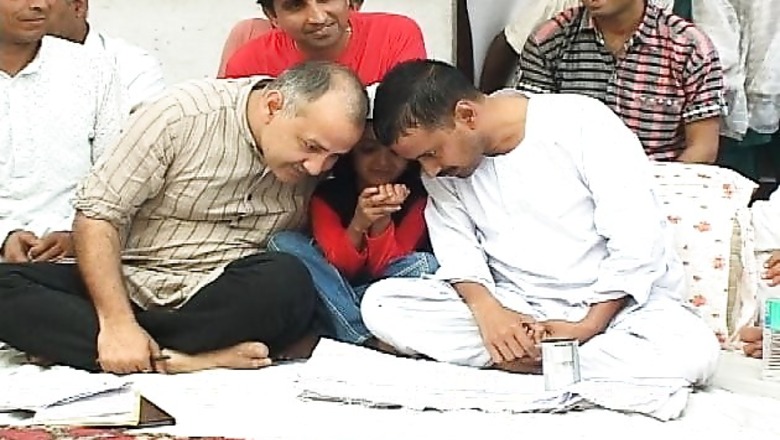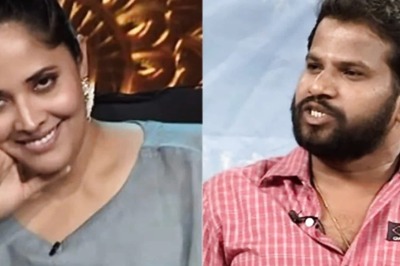
views
Arvind Kejriwal has been on an indefinite fast since March 23 hoping to trigger a 'civil disobedience movement' against the Sheila Dikshit government in Delhi. More than 8 lakh people have already pledged their support to the campaign against 'inflated' electricity and water bills which reflects a popular discontent, though it remains to be seen how many of these people will actually refrain from paying their bills. In an obvious attempt to build on the symbolism of April 6, 1930, Kejriwal has given a call to AAP's volunteers to restore electricity in those houses where supply has been disconnected. As Arvind Kejriwal's fast continues in Sunder Nagri, what does this mean politically for the the Aam Aadmi Party? Is it time for Kejriwal to break his fast? And does a signature campaign automatically indicate support for the party? Rupashree Nanda spoke to AAP member Yogendra Yadav to get some answers.
CNN-IBN: Has the purpose of the fast been achieved?
Yogendra Yadav: The civil disobedience movement started with a long term objective and a short term objective. The minimal objective was that we should be able to turn electricity and water and issues of ordinary people into public issues of Delhi. To my mind, that has been met. The maximalist objective was to take fear away from the citizens of Delhi- that anyone will say is a long term challenge. We may have started but we have a long way to go.
CNN-IBN: What is the thinking within the party about calling off the fast? It's been 12 days now?
Yogendra Yadav: Of course, a lot of people are concerned. I get calls al the day from people, volunteers and sympathizers saying they are concerned about his health. So are we, so is everyone. He is a man of extraordinary resolve, at the same time there are limits to what human beings can do and therefore we are concerned. At the same time, his inner resolve and his sankalp in some ways says that when we haven't achieved the objectives with which we have started we cannot give it up. So, the question really is to balance - considerations of health on the one hand and considerations of the overall objective of the fast.
CNN-IBN: What is the political blueprint of the 'civil disobedience movement'?
Yogendra Yadav: Delhi Assembly elections will be our first trial of strength. And obviously, as a political party we are determined to make this first trial of strength into an effective one. We realize that the agitation at Ramlila Maidan and Jantar Mantar had given us very broad base of popular sympathy. But to convert that sympathy into political support- there were unevenness. And we realized that we had not reached deeply to the poorest of the poor in Delhi. And in many ways, this particular agitation guided the choice of issues as well. Electricity and water are issues that touch the poorest of the poor and we hope that in the course of this agitation we may have reached vast sections of the poorest of the poor. We clearly targeted JJ Colonies, Resettlement Colonies, all the Illegal Colonies and Rural areas of Delhi - which is where the poorest of the poor reside. And I do hope we are a force to reckon with. I should not make more bombastic statements because we are a new party and there is no point making fantastic claims. But I do hope that at the end of this month we are a force to reckon with in Delhi politics.
CNN-IBN: Ten lakh signatures would mean forty lakh people - when you look at these numbers what does it mean for you politically?
Yogendra Yadav: I would not assume that everyone who has signed would vote for us-I met people who said that I come from a Congress family but you are raising an honest issue - and I am with you. I would also not make an assumption that those who we could not approach during the movement will not vote for us. Because at election time, the mahol will be different and things could change. And I don't think it is really about numbers. What does ten lakh signatures mean? Ten lakh mean that this is not a symbolic agitation, ten lakh mean we are not a bunch of middle-class people signing on a small petition - that we do involve ordinary people. This is the agitation that has reached the poorest of the poor in some ways and that we have some platform to build upon. That is all we can claim right now, it is a very hard road ahead and a very tough journey for us ahead.
CNN-IBN: Is this a do-or-die moment for the party, a feeling of it is now or never?
Yogendra Yadav: I think a certain missionary zeal translates into this sense all the time - a sense of do-or-die is a sense that many volunteers have shared and, in some ways in order to put in your maximum you need to feel it. Looking at it from a distance, looking at this in the trajectory of our party's growth - I see this as a significant step forward not a do-or-die situation. I see it as a crucial rite of passage you could say though not a point of desperation. Though I think that this movement has put the party at a different footing. We were a party with very large sympathy - our challenge is to convert that potential sympathy which is scattered into supporters and convert some supporters into volunteers. This is the challenge that we are dealing with. It is a significant step forward in that direction but we have many more steps to take.
CNN-IBN: Established political parties laugh at your ambitions and chances, just 8,000 volunteers? Where is the money, the muscle? People vote on lines of caste and religion? How would you answer them?
Yogendra Yadav: There are big parties, it is not for me to refute their claims. I would say they are entitled to their laughter- all I can say is that something is changing in the country, something is changing among ordinary people of this city - particularly the idea that you can win only with caste and community and money and muscle power or with patronage. I know, a lot of politicians share the belief- but what they don't realize is ordinary people know that politicians think this way, that ordinary people understand that they are being treated like cattle - and once in a while in this country there comes a moment when the ordinary person who is taken for granted, who is used like a fool, who is used like cattle says enough is enough! Yes, they can laugh but we cannot say who will have the last laugh.



















Comments
0 comment